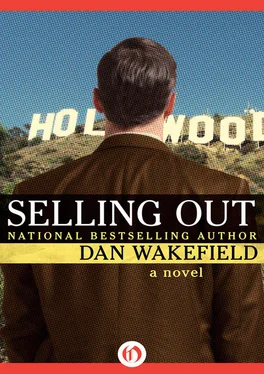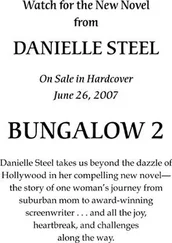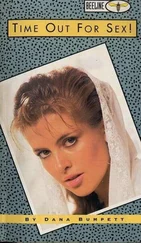“But I’m a writer.”
“Now you’ll be a writer-producer. What the Guild calls a ‘hyphenate.’”
Yes, Perry had heard about multitalented men who rose from the ranks of mere writers to become writer-producers or writer-directors. It was like being a double threat. And of course it meant more money. More power.
“I guess I’m shocked,” Perry said. “I wasn’t expecting this.”
“Think it over.”
“Yes, I’d like to do that. Can I have a little time?”
“You can let me know first thing in the morning.”
“Thank you,” Perry said.
Perry stuck one hand casually in the pocket of his silk-lined safari jacket, turned slightly to his left and lifted his chin.
Snap .
What a picture.
It was only his image in the full-length mirror in his bedroom, yet it seemed so perfect, so apropos , that he heard in his mind the quick snap of a shutter, imagined the photo, black and white and grainy on the printed page of a newspaper—the Entertainment section, say, of the L.A. Times , with identifying caption: THE PRODUCER.
He turned again, full profile now, and sucked in his gut. There was still a bit of a bulge, a reminder of his past, undisciplined life as a civilian. He would have to work on that. He was a leader now. He had to set an example. He smiled, wryly, not at all displeased, seeing himself now in full color on a slick magazine page— People , perhaps?
He was, after all, quite a story.
“The Transformation of Perry Moss.”
From wimpy academic to powerful producer. In less than a year. Perry pictured a comic strip showing shy Professor Grimsby surreptitiously ducking into a telephone booth, quickly changing out of his ragged tweeds and rep tie into a silk-lined combat suit with a gold chain and emerging tan and trim as Darryl diLorenzo, movie producer.
Perry turned back full face to the mirror and crossed his arms over his chest, cocking his head and admiring who he was, what he had become.
A Hollywood Producer.
“ Betrayer, you mean .”
It was Jane’s voice, clear as a bell. It was so real that Perry went out and looked around the living room, just to make sure she hadn’t flown in to surprise him as some kind of joke, or maybe to express her anger about his replacing the man he once so esteemed. That’s how she’d feel, of course, simply because she refused to understand how things worked out here. Perry went back and looked in the mirror again. He took a deep breath and stood up tall, taller, staring in his steely blue eyes, direct and unashamed.
Of course he felt badly about taking Ned Gurney’s place, but if he didn’t somebody else would. They could still be friends. It was nothing personal, it was business. Show business. It was dog-eat-dog and you better watch out for yourself. Perry gave himself a knowing wink in the mirror, then said aloud the simple slogan that was all he needed or wanted to live by in his powerful new incarnation as a hyphenate, a Hollywood writer-producer: “Go for it.”
Off and running.
Archer announced over coffee in his office that he and Perry were due at the network later that morning to view the last episode of “First Year” with none other than Max Bloorman and the East Coast brass! They were out here making heavy decisions and thought so much of this show’s potential they were willing to take an hour out of their valuable time to give the producers their own notes and comments while they watched . It was a unique opportunity. Archer suggested they take along Hal Hagedorn, whom he’d promoted to the post of story editor, now that Perry would not have time for his work with writers in his old role of story consultant. Perry agreed that Hal was the ideal choice, though he kind of wished Archer had asked his opinion first. No use nit-picking, though, things were rolling now. The East Coast brass would be waiting.
Perry assumed that the New York executives probably enjoyed their sorties to the Coast, and perhaps had worked this one in as part of their Thanksgiving holiday. He figured they would be in that kind of mood, shedding some of their Eastern burdens along with their three-piece suits for a week or so to relax and refresh themselves in this brighter and lighter landscape.
He was wrong.
It may have been the day before Thanksgiving, but Max Bloorman and his men were not on any kind of holiday. They wore dark suits with plain, dull ties, and reeked of cigar smoke, cologne, and power. Jowly and glowering, they spoke in growls, reminding Perry not so much of New York businessmen as members of the Soviet Politburo.
Bloorman himself, with his shiny bald head looming above his black suit, his bushy steel-gray brows hooding blank eyes underlined with deep purplish folds of flesh, might surely have been cast as a senior official of the KGB. His principal sidekick, Otis Runcible, was a small, immaculate man with black hair slicked straight back from his brow and an expression of grim deliberation reminiscent of the late Lavrenti P. Beria.
Perry was relieved when the grumbled introductions were over and the lights went out in the network’s executive screening room. He figured if this episode on Jack and Laurie battling acid rain could get a human sigh out of these guys it could be subtitled “The Miracle Worker.” He was not surprised when the only sound that came from the executives during the show was sporadic outbursts of coughing brought on by the inhalation of their heavy cigars.
When the lights went on, Max Bloorman and his men, who were seated at the front of the screening room, did not even bother to look back at the film’s producers when they delivered their devastating notes. Hal, Perry, and even Archer had to lean forward to hear the snide and cutting comments that came from the powerful men down front, aimed at the ceiling like some of the smoke they blew. The show seemed to them “too soft,” too “candy ass,” there were scenes that were “chickenshit” and lines of dialogue as well as performances and direction that were “half-assed” and “pissy-ant.”
“Too many eggheads,” said Bloorman. “Especially that faggy professor.”
“You mean Laurie’s father?” Perry asked.
Lon Ridings, the actor who played that role, was a former Broadway cohort of Ned Gurney’s, and probably the finest, most brilliant actor on the show.
“Her husband’s one prof too many as it is,” said Bloorman. “You should make her pop a cop. Get some guts in this show.”
“Well, he can’t give up his tenure now and join the town police force,” Perry said.
“Why not?” asked Bloorman. “It would give him some balls.”
“Max, I think the cop is a great idea,” said Archer Mellis. “What if Jack’s father is a cop?”
“Jack’s father is a lawyer,” Perry said.
Archer gave him a dirty look.
“We haven’t seen him yet. He could be a cop, and move into town—maybe even move in with his son and his daughter-in-law and her family.”
“Go for it,” said Bloorman.
He stood up, got out a handkerchief, and blew his nose. He looked at the handkerchief, stuffed it back in his pocket, and walked toward the door without a word, his henchmen following.
“Thank you so much—this was invaluable,” Archer called after them.
Perry, in despair as well as anger, called to the powerful executive.
“Excuse me, Mr. Bloorman, but is there anything you like about our show?”
Bloorman turned and stared at Perry, looking him up and down as if he were a street bum who had just begged for a dime.
“We renewed it,” he said, spitting out the words like the annoying bits of cigar tobacco that flecked his big, fleshy lips. Then he pushed on out the door, his troops following.
Читать дальше












